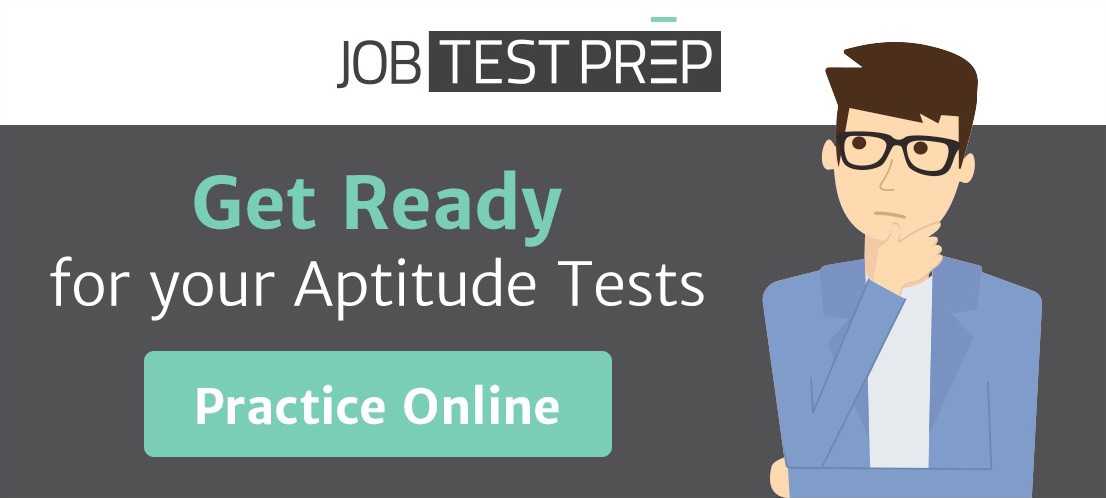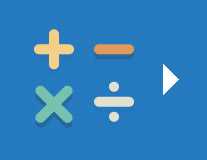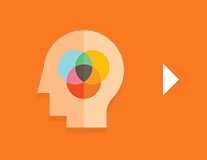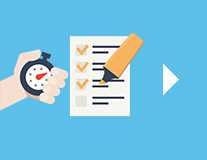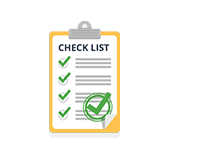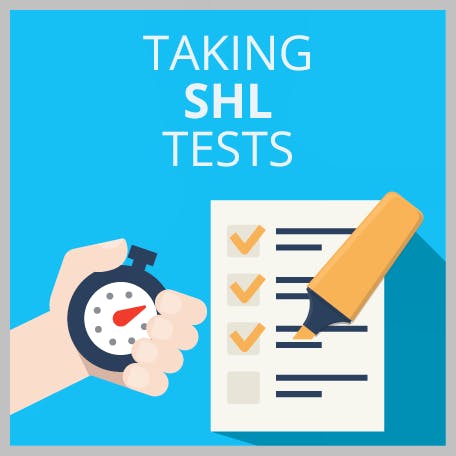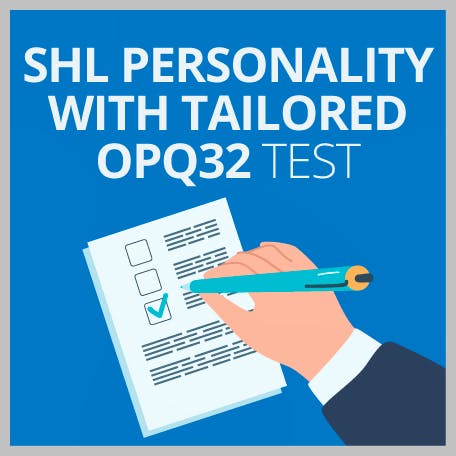How to Pass the SHL Deductive Reasoning Test in 2026
Updated July 28, 2024
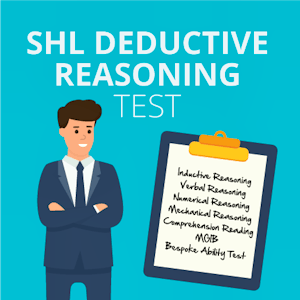

The SHL Deductive Reasoning Test is an assessment employers use to evaluate candidates' logical thinking skills.
It presents logical arguments and requires candidates to determine if conclusions follow from given premises.
Candidates can prepare by practicing tests, honing logical reasoning skills, and familiarizing themselves with formal logic rules to excel in this assessment.
What Is the SHL Deductive Reasoning Test?
The SHL Deductive Reasoning Test is a cognitive assessment tool used in the recruitment and selection processes for many roles in several industries.
SHL (Saville and Holdsworth Ltd.) is a well-known company specializing in psychometric assessments and organizational talent measurement solutions.
SHL assessment tools are used in the early stages of the recruitment process, enabling recruiters to identify candidates with the specific aptitudes needed for success in a role in an organization.
SHL offers employers a suite of online assessment tools, including
- SHL Inductive Reasoning Test – A 25-minute test includes 24 questions that test your nonverbal and spatial abilities through a series of shapes and patterns.
- SHL Verbal Reasoning Test – With 30 questions to answer in 19 minutes, the verbal reasoning test assesses your cognitive ability through logical deductions and understanding of oral and written information.
- SHL Numerical Reasoning Test – Lasting 25 minutes with 18 mathematical problems to solve. This test evaluates an individual's ability to solve numerical problems.
- SHL Mechanical Reasoning Test – A 25-minute mechanical test assessing a candidate's understanding of mechanical principles such as gears, pulleys and levers.
- SHL Comprehension Reading Test – Candidates must deduce information from written statements; the test comprises 18 questions to be answered within 10 minutes.
- SHL Management and Graduate Item Bank (MGIB) – This 92-minute test is taken for managerial and graduate-level positions. Consisting of three sections, it assesses a candidate's creativity, verbal reasoning and numerical understanding.
- Bespoke Ability Test – Used for candidates applying for positions in the finance and sales industries, this test consists of custom-made questions tailored to the company's needs.
Whereas inductive reasoning tests require candidates to think logically to spot patterns in a sequence of graphics, deductive reasoning tests give candidates the statements and the outcomes and ask the applicant to deduce which possibility is correct.
The SHL deductive reasoning rest explicitly evaluates a candidate's logical thinking and problem-solving skills.
It presents candidates with a series of logical statements or rules. It asks them to deduce conclusions based on these rules.
This test assesses the ability to analyze information, recognize patterns and, most importantly, make logical inferences from the information given.
Deductive reasoning is a valuable skill in many professions, especially those that require critical thinking, problem-solving and decision-making.
This means the SHL deductive reasoning test is a popular assessment tool many employers use, especially in the professional services sector.
Examples of the SHL Deductive Reasoning
There are different types of the SHL deductive reasoning test: one interactive version (SHL Verfiy G+) and two non-interactive versions (SHL Verify G + non-interactive and SHL CEB deductive reasoning test.
The non-interactive versions of the test are multiple-choice assessments where candidates select their chosen answer from a list given.
Below are some examples of questions you may encounter when sitting the SHL deductive reasoning test.
SHL Deductive Reasoning Practice Test Answers
SHL Deductive Reasoning Practice Test: Question One
In the following example, you're provided with two premises (statements). You are asked to draw a valid conclusion based on those premises.
‘Read the following two sentences and answers, then select which answer you believe to be correct.’
Statements:
All cats are animals.
Some animals are playful.
Conclusion:
a) Some cats are playful
b) All cats are playful
c) No cats are playful
d) Some playful things are animals
‘A new sandwich bar is launching a new range of healthy sandwiches.’
Statements:
Avocado is included if tomato is included in the sandwich
Onion can be selected only if cucumber is selected
Either lettuce or cucumber can be selected, but not both
Either avocado or radish must be selected, but not both
Which of the below is a complete and correct list of the vegetables in the sandwich?
a) Tomato, cucumber, capers, and olives
b) Avocado, tomato, onion, and lettuce
c) Avocado, cucumber, watercress, apple
d) Watercress, cucumber, gherkins, tomato

'Based on the provided information, which of the following conclusions can be logically drawn?’
Statements:
All birds have feathers.
Ostriches are birds.
Conclusion:
a) All animals with feathers are birds
b) Ostriches can fly
c) All birds can dive
d) Ostriches have wings
Five classmates – Alie, Benji, Kitty, Dev and Evie – are standing in a line to go into assembly.
They are wearing different colored shirts: red, blue, green, yellow and purple.
The following clues are provided:
Benji is standing to the right of Carol.
Alie is wearing a blue shirt and is standing at one of the ends.
Dev is wearing a red shirt and is standing to the left of Emma.
Kitty is standing in the middle.
Evie is not wearing a yellow shirt.
Based on the given clues, determine the order in which the friends are standing and the color of each friend's shirt.
Statement:
All mammals are warm-blooded animals.
Hippos are mammals.
If you need to prepare for a number of different employment tests and want to outsmart the competition, choose a Premium Membership from TestHQ.
You will get access to three PrepPacks of your choice, from a database that covers all the major test providers and employers and tailored profession packs.
When Are SHL Deductive Reasoning Tests Used?
SHL deductive reasoning tests are most commonly used by employers recruiting for a large number of vacancies or those looking to identify candidates with a specific proficiency level of deductive reasoning skills.
Employers use the tests in the early stages of the recruitment process to filter their applicant pool down to those with the required deductive reasoning ability for a specific role.
As the tests are easy and cost-effective to administer, candidates can complete the tests at home or a test center.
Candidates scoring highly on the test have the required aptitude in deductive reasoning and can progress to the next stage of the recruitment process. This enables recruiters to focus their time and efforts on the most suitable candidates.
Why Are SHL Deductive Reasoning Tests Used?
SHL deductive reasoning tests provide recruiters with a cost-effective and objective way to determine which candidates in an applicant pool have the required deductive reasoning and problem-solving skills to succeed in a role.
As the test is a timed assessment, the results indicate that applicants can keep calm under pressure and use problem-solving skills to reach a logical conclusion.
The test can also be used to assess how a candidate thinks.
Recruiters can use this to determine whether a candidate demonstrates logical thinking when solving problems and can make reasoned judgments to reach well-thought-out conclusions.
Preparing for these tests can also show that the candidate has organizational skills and can deal with and be prepared for anything unexpected.
How to Prepare for Deductive Reasoning Tests
Preparation before sitting an SHL deductive reasoning test is essential.
While the test evaluates an individual's inherent abilities, there are many things you can do to ensure your natural ability shines through.
Here are some SHL deductive reasoning tips:
Step 1. Understand Deductive Reasoning
Familiarize yourself with the concept of deductive reasoning.
Understand the difference between deductive and inductive reasoning.
Deductive reasoning involves drawing specific conclusions from general premises and making logically sound conclusions based on the given information.
Step 2. Practice Tests
It is essential to take an SHL deductive reasoning practice test before sitting the actual SHL test to familiarize yourself with the format and question style.
Both online and offline practice tests are available. When practicing, ensure you do so under timed conditions.
Simulating the time pressure you will feel when taking the test helps you understand how you react in a pressurized situation.
The more SHL deductive reasoning practice tests you do, the more confident you will feel.
Step 3. Learn Logic Patterns
Deductive reasoning tests present information in the form of statements or scenarios.
Learn to identify common logical patterns such as syllogisms, conditional statements (if-then statements), and logical equivalences.
Practice breaking down complex statements into simpler components.
Step 4. Manage Your Time
All SHL deductive reasoning tests are timed tests.
When practicing for the specific type of SHL deductive reasoning test, ensure you time yourself for the exact duration of the actual test. This will help you improve your test technique and the speed at which you can answer questions correctly.
Step 5. Base Your Answers on the Information Given
The SHL deductive reasoning assessment evaluates candidates on their deductive reasoning ability using only the information given.
Candidates should base their answers on prior knowledge and disregard previous knowledge or assumptions.
Step 6. Manage Your Well-being
Take care of your well-being in the days leading up to the test. Being tired, hungry and thirsty can affect your performance.
Get a good night's sleep the night before the test.
On the test day, ensure you have eaten and are well hydrated. Managing your well-being ensures you can focus on the test.
Step 7. Hone Your Deductive Reasoning Skills
Develop your deductive reasoning ability by reading articles or news stories.
Determine the critical facts of the information yourself and simply the information to understand the key messages before reading the full article.
Step 8. Strengthen Critical Thinking
Deductive reasoning requires strong critical thinking skills.
Develop your critical thinking abilities, such as solving puzzles, brain teasers and riddles.
Analyze arguments and statements in your daily life to improve your ability to identify flaws or inconsistencies.
Step 9. Understand the Concept of Propositional Logic
Propositional logic uses logical operators to deal with propositions and their relationships (AND, OR, NOT, IF, THEN).
Understand how these operators work and practice applying them to various scenarios. This will help to familiarize you with how premises can lead to valid conclusions, meaning you understand how some deductive reasoning questions are presented.
The best way to attain your highest score on the SHL deductive test is to take an SHL deductive reasoning practice test.
When practicing, ensure you do so under timed conditions. Make sure to practice the type of test you will sit.
Manage your well-being in the days leading up to the test, and hone your deductive reasoning skills by practicing puzzles.
SHL deductive reasoning practice test answers can be found in this article.
Also, visit practice test websites such as TestHQ.
In any role, integrity is highly valued, no matter the employer or industry.
Ensuring you answer the questions on the SHL test yourself ensures that you show the employer your deductive reasoning skills.
In doing so, employers can gauge which candidates have the required skills to succeed in a role and the organization.
The best way to prepare for the assessment is to take an SHL deductive reasoning practice test.
There are several websites available that contain an SHL deductive reasoning practice test, try the ones on TestHQ.
The length of the SHL deductive reasoning test varies depending on the type of test set.
The SHL Verify G+ Interactive test lasts 18 minutes and comprises 12 questions. The SHL Verify G+ Non Interactive test and the SHL CEB Deductive reasoning tests last 20 minutes with 18 questions to answer.
The SHL deductive reasoning test is a rigorous evaluation of an individual's deductive reasoning abilities. To do well in the test, it is essential to prepare, practice the tests, and look after your well-being in the days leading up to the test.
Ensuring you are in the right mindset to complete the test gives you the best opportunity to perform to the best of your ability.
Samples of the SHL deductive reasoning practice test can be found on the SHL website and on TestHQ. This article contains example questions you may encounter when sitting the test and SHL deductive reasoning test answers.
Final Thoughts
SHL deductive reasoning tests are popular assessment tools used by a variety of employers.
They use the test as part of the recruitment process for graduate and experienced vacancies.
The results of the test enable employers to identify which candidates in an applicant pool have the required level of deductive reasoning skills needed for success in a role.
Given their popularity, candidates applying for vacancies should ensure that they know what the tests involve and how they can prepare for them.
As the tests are administered online, employers can request individuals to complete the tests with limited notice.
To perform to the best of your natural ability in the test, prior preparation is essential. This means taking an SHL deductive reasoning practice test under timed conditions.
Being prepared for the test reduces stress and contributes to improved performance.
The more practice of the SHL deductive reasoning tests you take, the more prepared you will be. This can make the difference between you and another candidate.

